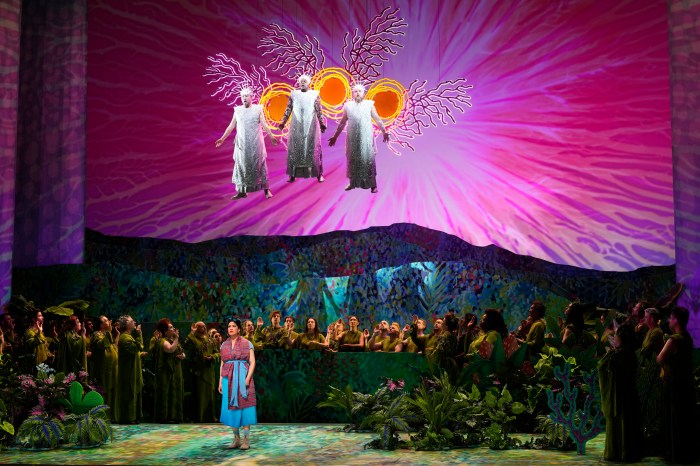
The unmistakable wah-wah guitar intro from Isaac Hayes’ “Theme from ‘Shaft’” signifies the return of one of the true action-movie originals. The character of John Shaft originated with Richard Roundtree in the 1971 eponymous film and its two sequels, before being revived by Samuel L. Jackson in the 2000 remake. The two have reunited for a new “Shaft,” this time joined by John Shaft Jr., played by Jessie T. Usher, a far more modern and woke crime-fighter bearing the Shaft name.
Directed by Tim Story (“Ride Along”), the latest “Shaft” was filmed in New York at many famous Harlem landmarks. Three generations of John Shaft came to Harlem’s iconic Red Rooster restaurant recently to talk to amNewYork about their movie.
“This action-comedy version is very different from what I had seen before,” Usher says about the film’s comedic leanings compared to previous movies. “Although it was nice to keep some of [the original] elements, I had to remind myself that we are making something different.”
Jackson’s instincts told him Usher would be the best young actor to play Shaft’s son, J.J.
“When he came into the room to audition, he was the guy that wasn’t shy and didn’t back down,” says Jackson. “He understood that dynamic of being this kid who had grown up in this specific way and how to challenge my street knowledge with his book knowledge.
“When he does get into a problem, he realizes the person that can probably help him solve it is this guy that he hadn’t had a relationship with,” Jackson adds. “He finds out there are specific things that go along with being somebody named Shaft.”
Usher realized that there are certain elements come with infusing a script with humor and a contemporary sensibility and that Kenya Barris, who created “Black-ish,” could bring them.
“I knew that if there’s going to be a comedic version of this with a Millennial Shaft, Kenya would be the one able to pull it off,” Usher says.
For Roundtree, returning once again to the character he made famous was a richly satisfying experience.
“I had tried unsuccessfully to distance myself, and it hasn’t worked,” he says. “This is the first time I can say I’m really thrilled and honored and happy. To see the transition of my grandson to really own the name ‘Shaft’ is a beautiful thing to watch.”
Adds Usher, “Having Richard Roundtree’s blessing on this one was more than enough for me to say that this was something I needed to be a part of.”
All three men have histories with New York, which plays its own role in the film, whether it’s Roundtree coming down from New Rochelle to buy cool clothes in the ’70s or Jackson coming here to see theater — his wife LaTanya Richardson is currently in Aaron Sorkin’s Tony-winning play “To Kill a Mockingbird.” Jackson has that in common with Usher, who would frequently come up from Maryland to see shows.
“I think progress is progress,” Jackson says about the changing face of the city. “The shade of Harlem has changed, the cultural dynamic is changing, but everybody seems to be coexisting pretty well. There are better restaurants, and the people are surviving.”
Recently, filmmaker John Singleton, who directed Jackson in the 2000 “Shaft,” passed away.
Jackson had known Singleton long before making that movie together, and they had been making plans to do another movie together in the fall before Singleton’s untimely death.
“John helped a lot of young filmmakers, no matter who it was,” Jackson says about his longtime friend. “John was the kind of guy that if you asked him to help you, he would go out of his way and help you.”

















